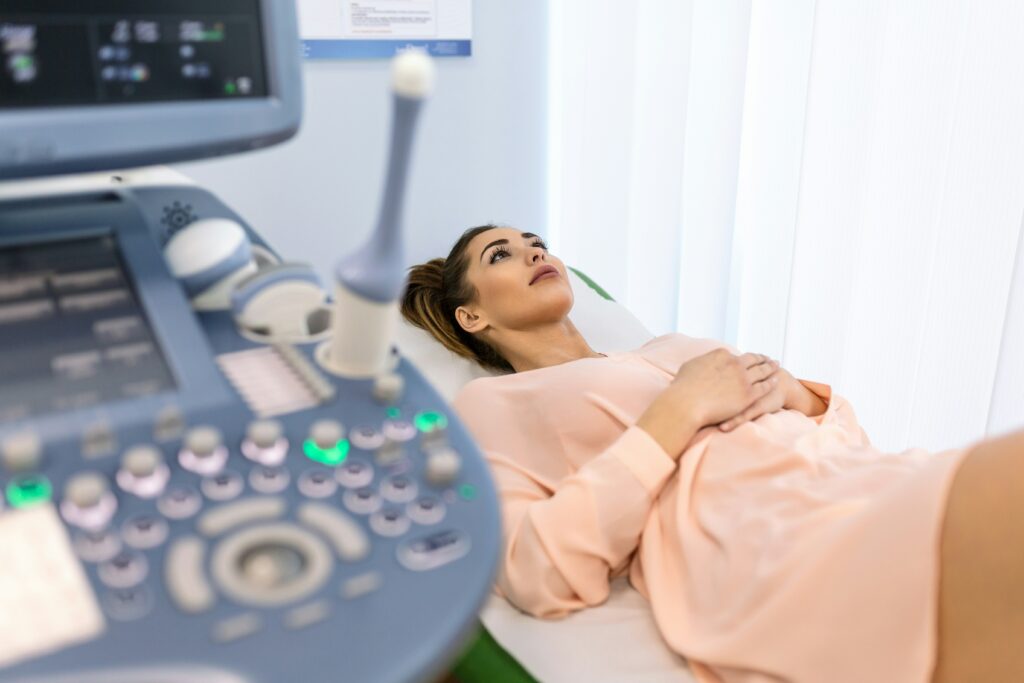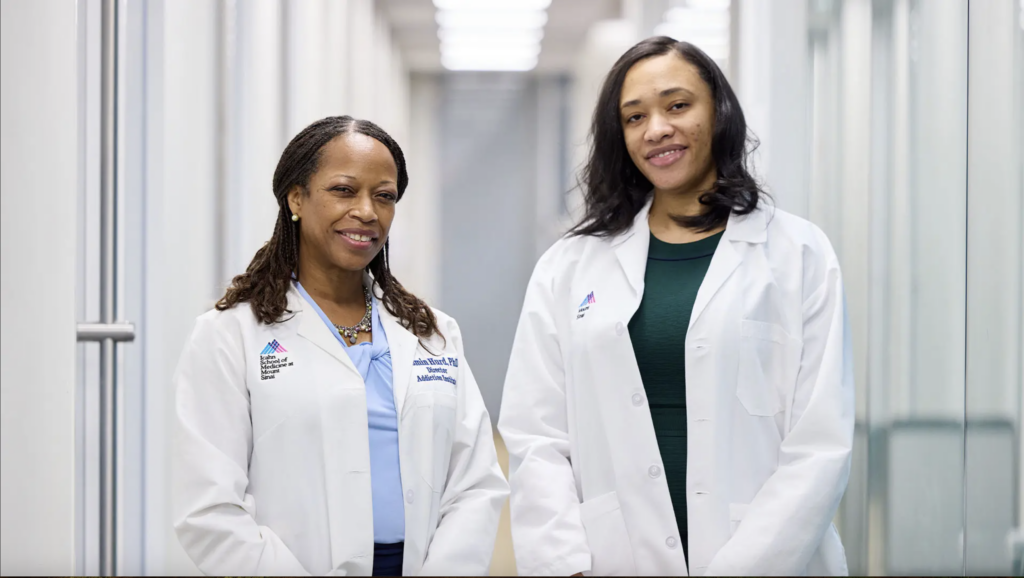Of all the words you don’t often hear together in one sentence, the combination of “pregnancy” and “substance use” is at the top of the list. But the most taboo mental health challenges are often the ones that most desperately need attention. So that’s exactly why we’re shining a spotlight on substance use during pregnancy this month.
We’ve invited one of our valued referral partners Dr. Leah Habersham, who combines OBGYN services with addiction treatment through her Bridge Program, to share with us her insights from this unique intersection in care. She shares that the need for these combined services is much greater than you might think — and neglecting to provide them can have life-lasting consequences for both mother and child.
How can we as a society help women to seek substance use treatment if needed? What happens if it comes to light that a pregnant woman is using? Dr. Habersham tells us her experience and insights.
RevCore: Dr. Habersham, your clinic provides both OBGYN services and substance use disorder treatment — both such critical health services, yet so rarely seen together. What got you into this field?
Dr. Habersham: I’m an OBGYN by residency training, and I came across several patients who had a history of addiction. I realized there was a lot lacking in how we provided treatment, and surprisingly even many of the doctors who deal with high risk pregnancies weren’t very familiar with managing substance use disorder.
I realized that there were some — though very few — providers who had this dual background in OBGYN and substance use treatment, and I realized that that was something that I wanted to do. So I went back and did a fellowship in addiction medicine with the hopes of starting a program where I could provide integrated OBGYN and addiction care. And that’s exactly what I do now.
I also had a personal motivation as I have a parent who struggled with addiction through much of my childhood and who then entered into recovery. Knowing how long it took to reach that point, but also that it’s possible for someone to recover from a strong addiction and become a really stable, productive individual, gave me a unique experience which is useful to providing this type of treatment to this population.
RevCore: That’s truly incredible. You mentioned that not many doctors are familiar with how to help pregnant women who are using. Is it a very small population then?
Dr. Habersham: The data shows that about 10% of pregnancies have some level of substance use — whether it’s a disorder or recreational. Any substance use during pregnancy is of concern, because of the potential impact on mom and baby. So even if it’s not necessarily a disorder, it warrants our attention and intervention so that we can try to optimize the progression of the pregnancy.
So the statistics show that it’s not uncommon. It’s just that with all the stigma out there, most people are not going to shout it from the rooftops. Instead, a lot of times people suffer in silence, don’t reach out for help to stop, or don’t have the knowledge to even know that they should stop. Because there’s such limited knowledge on both ends from providers to patients. And that’s also why there’s so little treatment available for substance use during pregnancy.
RevCore: You mentioned that stigma often prevents pregnant women from admitting to using. So how do OBGYNs and other providers typically find out if there is substance use during pregnancy?
Dr. Habersham: That really varies. In limited cases, women may reveal it with the intention of asking for help. The few times that I encountered patients with substance use disorders before I entered this field, it was because I had built such a rapport with the patient that they felt comfortable enough to tell me.
When providers take a compassionate, patient-centered approach, they can increase the chances of this happening. For example RevCore is a great provider who does that. That can help patients come forward if there is substance use during pregnancy.
Otherwise, some institutions do universal testing, so there may be cases where it’s found out through a positive toxicology. Another screening tool is a questionnaire, usually at the beginning of the pregnancy or sometimes at the time of delivery.

RevCore: What will the providers typically do after they find out a patient has substance use during pregnancy?
Dr. Habersham: Well, what should happen is that the provider tries to counsel them, provide them with education and knowledge, and empower them to make a choice. Do they want to continue using substances, do they want to get help?
The provider should also assess to make sure that their circumstances are safe. For instance, if someone has a dependency to something like alcohol, you can’t just quit. So in those cases, it may be unsafe to suddenly stop using alcohol.
You need to have the person assessed by someone who is familiar with substance use disorders and knows how to link them with the appropriate care.
RevCore: So that’s what should happen ideally… and what actually happens?
Dr. Habersham: It’s very provider dependent. Sometimes providers don’t have the training or the knowledge of what’s required of them as mandated reporters. They don’t always know what they should do next. I know it’s not very reassuring to patients, and that’s probably why a lot of them don’t seek help.
But there are still clinics who will do what’s right. For example, if RevCore finds out a patient has substance use during pregnancy, they will refer them to me. And similarly, if I get a patient who only needs general substance use treatment, I refer them to RevCore.
RevCore: What about at your clinic? What will typically happen when you find out a pregnant patient is using?
Dr. Habersham: That’s the whole point of my clinic — to provide care for women who have a history of substance use or substance use disorder, whether they’re pregnant or not. So it’s not something that’s novel to us, and we know what to do.
My patients get addiction treatment, of course, as well as prenatal care if they’re pregnant. If they’re not, I provide GYN care. The point of the clinic is to make women feel comfortable, to provide the care that they need regardless of their choice.
I also provide education on the impact of substance use during pregnancy to mom and baby, and we create a plan of safe care. That’s an important aspect of pregnancy management in the case of substance use disorders, just to get patients thinking about all the things that might happen if they relapse, and to have supports in place to make sure that the mom and baby stay safe.

RevCore: How big of a risk is there that a patient may get reported?
Dr. Habersham: I’m honest with my patients from the beginning because I think that’s really important to let them know what my role is as a mandated reporter.
And that’s not to report somebody because I know they’re using substances. Of course, if there’s someone in danger, I let them know that in those cases, I would have to report. But if you have substance use during pregnancy and you are now here with me, obviously you want treatment, you want care. So that’s what I provide.
RevCore: Speaking of treatment, is it safe for a woman who is pregnant or breastfeeding to take substance use disorder medication?
Dr. Habersham: There are multiple addictions, and multiple treatment options for each of those addictions. There are treatments that are safe in pregnancy or during breastfeeding. So it’s just a matter of being placed on the right medication for the current circumstance. That’s something I assess with every patient, to find a treatment option that is safe for them during their pregnancy.
RevCore: You also mentioned you help educate your patients on the potential outcomes of substance use during pregnancy. Could you speak about what those outcomes could commonly be?
Dr. Habersham: There’s a huge range of things that can happen with substance use during pregnancy. A specific example for the baby would be fetal alcohol syndrome. This is a very serious condition resulting from alcohol exposure during pregnancy, which can cause the baby to have physical deformities, brain damage, and growth problems. Another example is neonatal opioid withdrawal syndrome, which is specific to opioids. This can lead to withdrawal symptoms in the baby such as sleep disturbances, feeding difficulties, problems breathing, and seizures.
For mom, if she’s using things like cocaine that can increase the risk for preterm labor, abruption, and other complications. Overdose is another concern with ongoing substance use. The list goes on.

RevCore: And can these outcomes be mitigated if a woman stops using?
Dr. Habersham: There are definitely things that we can try to mitigate, depending on what the substance is and what the problem is. For instance, if a woman was using heavy alcohol early in pregnancy, that could have impacted the formation of the fetus or embryo early on. Sometimes those are things that we can’t take back. But as the pregnancy goes on, if there’s continued alcohol use, there’s other things that can additionally happen that could have been mitigated. So it’s just dependent on the substance, it’s also dependent on the timing of the use.
The treatment is also a factor to consider. For example the treatment of choice for an opioid use disorder is often treatment with methadone or suboxone. These are things that can also cause neonatal opioid withdrawal syndrome. But if we know it in advance and mom has decreased her use of other substances that aren’t prescribed, we have better chances of improving outcomes.
RevCore: It sounds like a lot can be improved through seeking treatment — yet many women are hesitant to do so. What advice would you give these women?
Dr. Habersham: It’s a scary thing to have to come to terms with and have to deal with. So I think finding providers such as myself, who are familiar with the population and treatment options, is important.
One way you can do that is by going through a harm reduction program. That’s a good way to get linked with a provider who provides trauma-informed and destigmatized care, as opposed to ending up with a provider who is not knowledgeable and who may think that the next step is to call ACS or something when it’s not necessarily needed.
So they don’t have to reach out right away to an OBGYN. It can just be a provider who is familiar with the population and knows what to do next. For example, RevCore also works with this population. So they can start providing treatment and then when it comes to light the patient has substance use during pregnancy, they refer the patient to me.
RevCore: What about friends or family? What can they do to encourage any women they know to seek help if there is substance use during pregnancy?
Dr. Habersham: You always have to meet people where they are. If someone is not ready to enter into treatment, you can still encourage them to at least start prenatal care. The literature shows that outcomes do improve, even if a woman has active use, if she at least starts prenatal care.
And again, the best route is connecting them with programs or providers who support harm reduction, such as RevCore. They can then link the patient with a prenatal provider.

RevCore: Are there any particular improvements in care for a pregnant woman that you’d like to see in the future?
Dr. Habersham: I think going back to the basics of how we screen people, how we provide interventions, how we refer them to treatment, would really be beneficial. I’d love to see the SBIRT model implemented into every prenatal care program. That means screening for substance use, identifying whether interventions are needed, then assessing if they need treatment, and if yes then referring them to that treatment.
This needs to be done in a way that the providers are fully informed about what they should be doing and what’s expected of them. This way all patients can get the care they need as opposed to being met with people who lack the knowledge to appropriately manage the population.
It’s not about everybody tailoring their programs to this population, but rather identifying these women and decreasing stigma, so the women can be linked to a program that is familiar with how to deal with this population.
But we do also need more services for pregnant and parenting people, such as detox, inpatient rehab for pregnant people, and residential programs that accept people who have older children for example.
RevCore: Stigma always seems to be a huge obstacle in getting people the help they need. What do you think society could do to try to reduce this stigma around substance use during pregnancy?
Dr. Habersham: We need more training in substance use disorders, not just in the prenatal setting but even the regular clinical setting. I really learned nothing about substance use in medical school or my OBGYN residency.
This can be done if people realize that this is a real disease and that this patient population has a lot of unmet needs. So few have dealt with this population in a clinical structured setting. A lot of times they’ve only dealt with that population if they see someone using drugs on the street. So often, stigma comes from a place of ignorance and fear as opposed to having a knowledgeable concept of what substance use is and who is the typical patient.
RevCore: For anyone who might be interested in your services, how can they access them and what can they expect during the first contact?
Dr. Habersham: I have a program called The Bridge, which you can read more about online. If you’d like to make an appointment, you can call 212-659-8557 or email TheBridge@mountsinai.org. I always get patients scheduled in as soon as possible, usually even that week or the following week.
As for what they can expect, I try to get all the basics done on that first visit, like an ultrasound and any lab tests needed. So even if they don’t come back for another appointment, they can walk away with something.
I always do everything possible to make patients feel comfortable. I have a social worker that works alongside me who only works with my patients. And I make myself very accessible so patients can get in touch with me directly whenever they need.

RevCore: Do you also help connect patients with other services they may need?
Dr. Habersham: Yes, it’s my priority to make sure patients get the level of care they need. I am very aware of what’s available and I can connect patients with a range of services, both my own and external ones. My own clinic is starting support groups for women who are pregnant and parenting with substance use disorder. We will soon also have counseling with a CASAC trained social worker.
I’m also linked within the Mount Sinai Health System with detox rehab programs, and intensive outpatient care as well. And of course, I often refer patients to RevCore, if they need general mental health or substance use disorder treatment. So if a patient needs something that I don’t provide directly, I connect them with a provider who does.
Thank you, Dr. Habersham, for taking the time to speak on this overlooked yet critical topic. Your work and approach has a profound positive impact on the New York community. We envision a world where one day people around the globe have access to compassionate and supportive services like yours.
If you or someone you know needs OBGYN services and has a substance use disorder, reach out to Dr. Habersham at 212-659-8557 or TheBridge@mountsinai.org.
You can also find wholesome, destigmatized mental health and substance use disorder treatment at RevCore locations across New York. RevCore also has a special Women’s Program — a comprehensive resource designed specifically for women’s mental health, including everything from emotional support to practical solutions. It is now available at all RevCore locations. Please reach out at (212) 966-9537 or at info@revcorerecovery.com.
